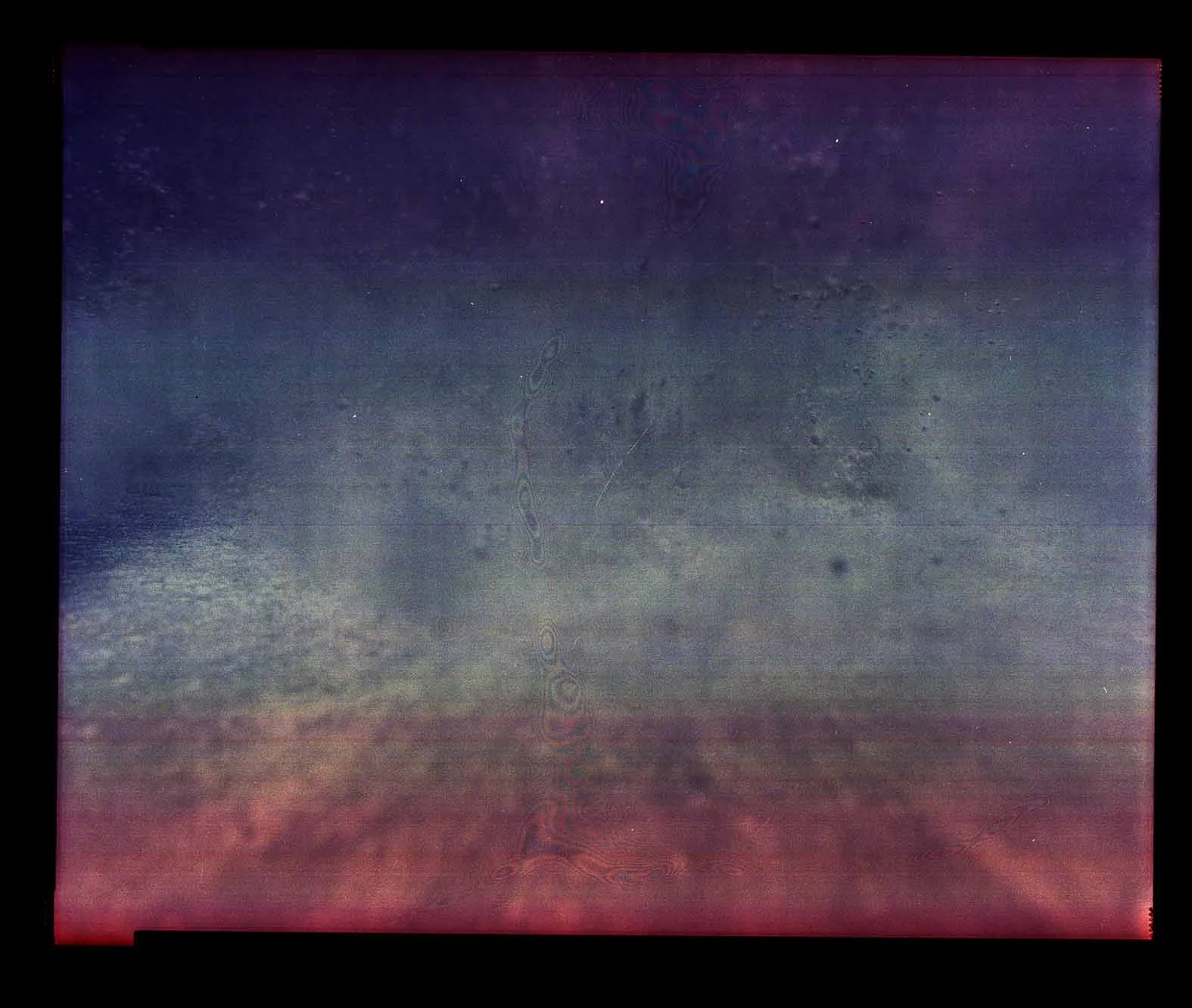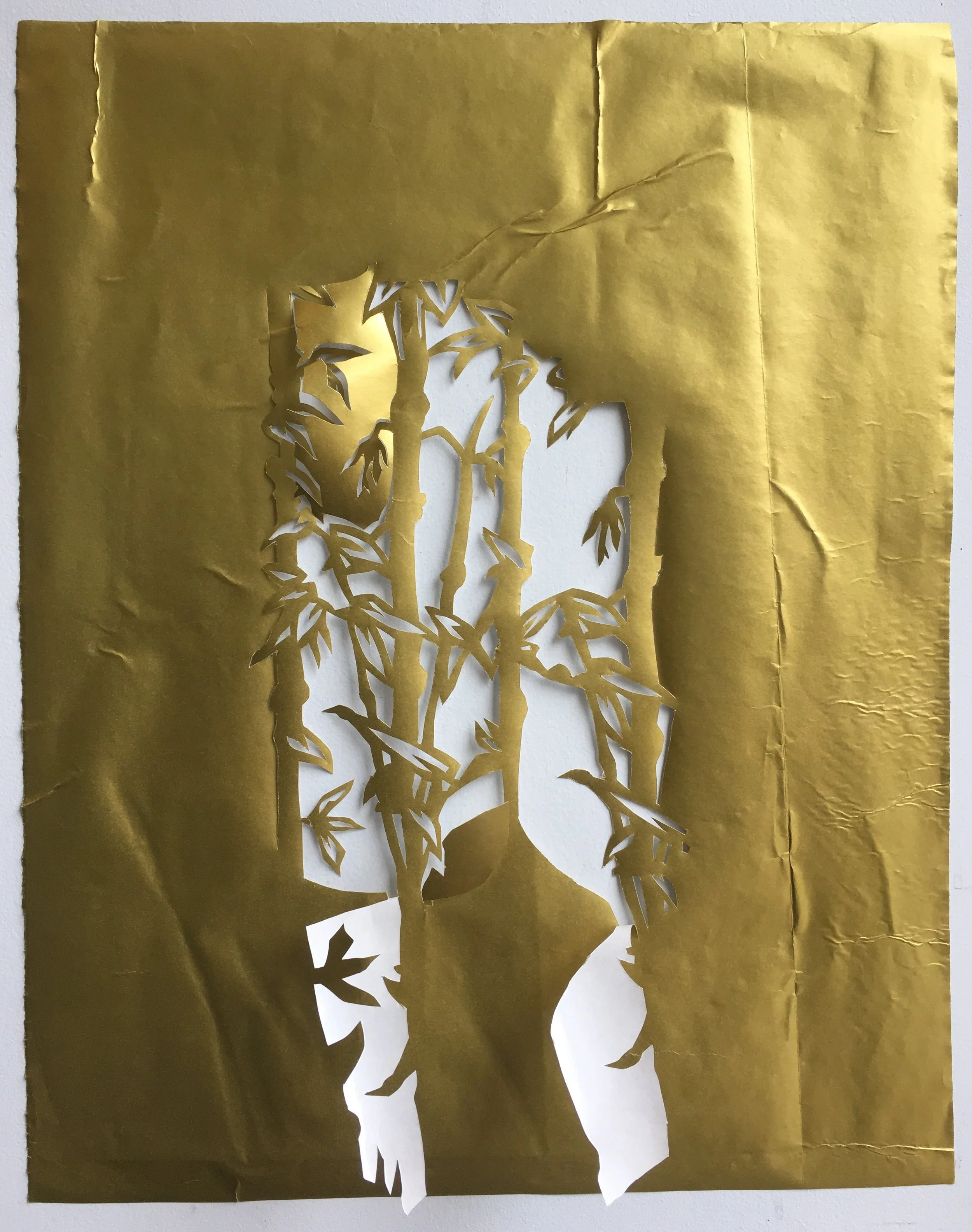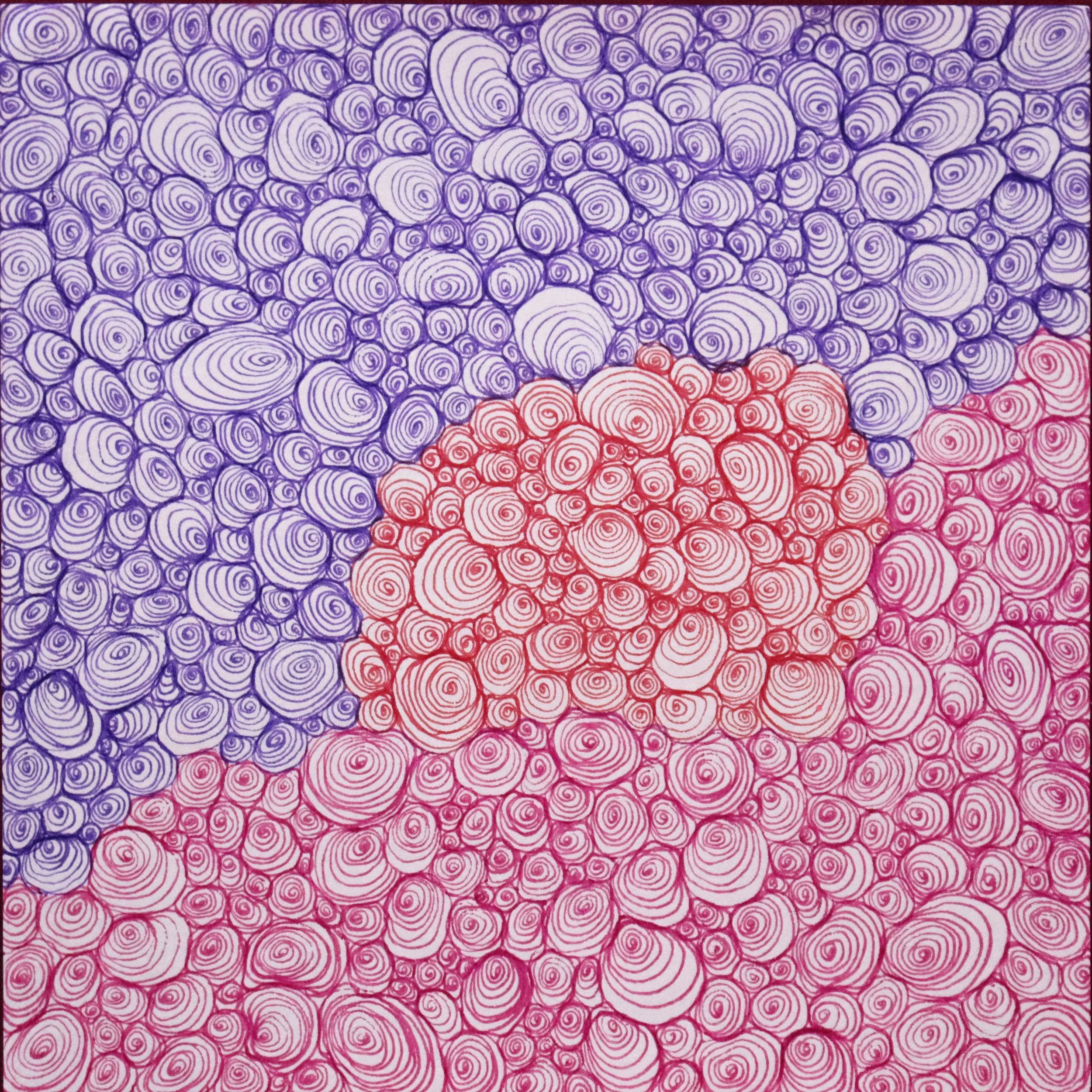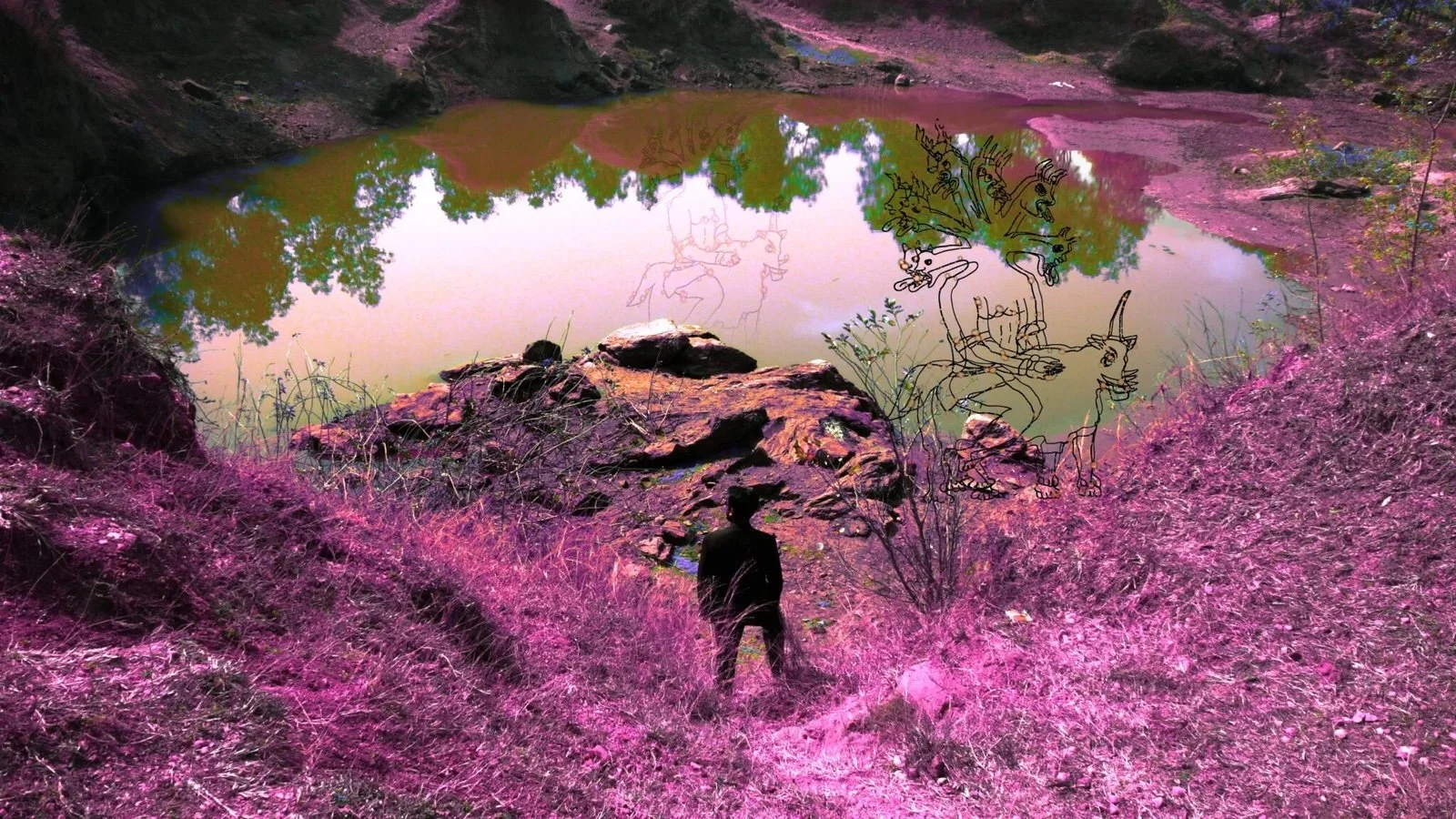Doctor Pollux Lacoste
By Atty Nicias J Alameda
Haris Rashid - Gelora (2023), Acrylic on canvas, 153 cm x 113 cm
Image description: A human figure steers a brown-colored boat on tall waves. He holds a long oar, which he dips into the water. The waves are incredibly colorful and luminous, rendered in shades of blue and purple. A myriad of animals, plants, and objects emerge from the iridescent waves. These include a bird, a fish, a cup of water, a butterfly, an oyster, flames, flowers, and more. Towards the right side of the painting, a miniature house and a cage float side by side on the waves. The sun is visible in the soft yellow background.
SO ELISHA DIED, and they buried him. Now bands of Moabites used to invade the land in the spring of the year. As a man was being buried, a marauding band was seen and the man was thrown into the grave of Elisha; as soon as the man touched the bones of Elisha, he came to life and stood on his feet.
I, Pastor Pollux Lacoste, have just finished reading the above text from the second book of Kings, chapter 13 as springboard for my Sunday sermon over my communications network
On the twentieth year of my preaching and broadcasting business Prosperity Kingdom Church I am living at ease in my home and prospering in my palace The locale is a ten-hectare plain along Mindanao’s eastern seaboard While walking on the roof of my palace I view the surroundings the works I made myself gardens and parks planted in them all kinds of fruit trees made pools from which to water the growing trees built the church temple auditorium airport also my wisdom increases with me a circumstance by which the university that conferred a doctorate on me recognized I commune with myself—Is not this magnificence I have fashioned for my pleasures and delights of the flesh the reward for all my toil? Has not the Lord laid the conditions for the prophet Isaiah how his prosperity would be like a river which I have faithfully obeyed?
A few female former members of Lacoste’s cult have turned around and have filed criminal accusations in the United States of America They alleged that Pollux, fat, short, and hairy, had sexually abused them even while they were still minors and had committed various offenses such as falsification of public documents, sex trafficking, fraud The much-ballyhooed prosperity of Doctor Lacoste is fake and does not come from his own efforts or industry The truth is that he got the monies from solicitations of the mostly minor children of the farmer members of his cult Summonses have been issued against Lacoste but he did not appear He is wanted in the United States The American government has commenced an extradition request with the Philippine authorities Lacoste filed a petition for prohibition with the local courts and personally pleaded with the President His petitions were denied upon the ground that a treaty as ruled by an appellate court is an agreement that must be performed in good faith as stated in the old feorus of Aragon pacta sunt servanda
—A big ruckus erupts in the local scene over the news that a team of U.S. Marshals has arrived in the country to extradite Doctor Lacoste to stand trial in the United States—
December twenty-third In the bleak onset of winter, for whatever reasons Lacoste announces over his broadcasting network that the second coming the Last Judgment will take place on Christmas Day His personal plane stands by at the runway with a bag of monies and precious stones His followers are on the mountaintops and the roofs of their houses waiting for the glorious event Many of them have turned over their possessions to the pastor Blessed are the meek, for they shall inherit the earth Immediately after the announcement a contra broadcaster and public affairs critic popularly known as John the Baptist with whom Lacoste once debated catches on to the news The latter had lashed out at the former for his comments and had drilled into his head the maxim that the love of envy is the root of all evil Alluding to the pastor’s much-bruited prosperity the critic icily countered that behind every fortune is a crime come naughty little brown heart You have made much of your doctorate, you patronize the slow-witted and dull but you cannot distinguish appearance from reality, free will from determinism, being from nothingness, what precedes what – existence or essence, cannot judge how far is forever, cannot compass the dimensions of depth He says that Lacoste is a false prophet skilled in flippant reasoning He has overreached himself lifted up his heart puffed up his head with overweening pride and exalted himself to the Lord of heaven What a fine prospect for a starry crown just spilled it on the drain flew too close to the sun wings made of wax worked wonders able to stop the storm but could not ease up traffic mess roll away tires won’t budge motorists are stiff-necked Jesus himself warns that before the Second Coming false prophets will appear to lead many astray but about that day or hour no one knows, not even the Son, and it cannot be rushed To whoever wishes, the Last Judgment comes every day But be alert keep awake for you do not know when He will come, in the evening, or at midnight, or at cockcrow, or at dawn, or else He may find you asleep when He comes suddenly His anger provoked by the commentator’s critique, Lacoste vows revenge
Morning gilds the skies From the roof of his palace the doctor’s eyes rove far away to the arc of space above A waif of a moon hangs at the center Tiny sparks of light are fluttering down as if remnants of a galaxy of stars that has recently exploded and below them an outline of a star close to earth shimmers yet No comets seen the doctor muses the sun is not darkened the moon gives its light no stars are falling no trumpet sounds the heavens are not shaken O Lord am I lost? What tangled web we weave Woe unto me for I am undone a man cast with a vicious mole of nature carries the stamp of that defect to his own doom
From the depths of his soul Lacoste addresses God: I have been overzealous for you Lord and now they are hunting me down I have observed strict discipline over your commands lest after I have preached to others I myself will be cast out Marana tha, O save Lacoste feels his heart quiver his breasts are drenched by the sweat of his face his eyes dim his legs sway he falls on the floor body shaking all over A few minutes later his vision clears and his breathing lightens
In his dream and in the fantasies of his head he sees a messenger coming down in clouds from heaven and he cries aloud saying O inveterate man I know thy works thy insolence and the pride of thine heart you have been weighed on the scales and found wanting You shall be driven away from human society and suffer from insania Your mind shall transform like that of the lower species until you atone for your crimes with restitution to the people you have oppressed
The judgment is immediately executed He wanders on the wasteland, the waterless regions, and on the mountain range looking for a place to rest He lives among the tombs and on the craggy edge of sea No one had the strength to bind or subdue him anymore the chains he wrenched apart, and the shackles he broke in pieces Night and day he is always howling and bruising himself with stones A marauding band is seen stopping by the tomb; a moan issues from inside, the band scampers away As soon as the light touches his face, the man comes to life with all his wits about him and stands on his feet The U.S. Marshals heard of him and said, let him be Some work of noble note may yet be done and save—
Haris Rashid - Holding On (2023), Acrylic on canvas, 108 cm x 126 cm
Image description: A figure sits on a boulder on a body of water. He holds an orange umbrella against falling rain. He wears a red shirt, on the back of which is a glowing spiral. The water surface is covered in colorful lily pads and tall flower stems. The figure faces the background, where large gray clouds are rendered in spirals.
Atty Nicias J Alameda was born in Estancia, Iloilo, Philippines. He has a bachelor’s degree in English and finished his law degree. He worked for several years in a government bank as a manager and a lawyer before retiring. He spends his spare time writing sermons and short stories, and doing other scholarly work.
*
Haris Rashid was born in 1992 in Kedah, Malaysia. He holds a diploma in Illustration from The One Academy. Malaysia Art has been a part of this artist’s life from early on, particularly since his high school days, encouraged by his mother, who also was his school’s art teacher. For a short period Haris Rashid studied Textile Technology at the tertiary level, but later switched to Illustration, obtaining his diploma from The One Academy. After completing his formal studies, he opted to pursue art as a career, and is today a full time artist. As he continues to develop his visual language, Haris often experiments with various media combinations and surfaces, wood and textured pressed paper being two surfaces he likes working with most. In recent years, nature have become the mainstay of his topical focus. Exploring folklore and mysticism in Asian cultures that relates back to modern context. His narratives in his works are also personal journey as self reflections.
If you’ve enjoyed reading this article, please consider making a donation. Your donation goes towards paying our contributors and a modest stipend to our editors. Singapore Unbound is powered by volunteers, and we depend on individual supporters. To maintain our independence, we do not seek or accept direct funding from any government.











‘But later… we didn’t talk about love. We talk about the land and its people.’ – a short story by Kaushik Ranjan Bora, translated from the Assamese by Aruni Kashyap.